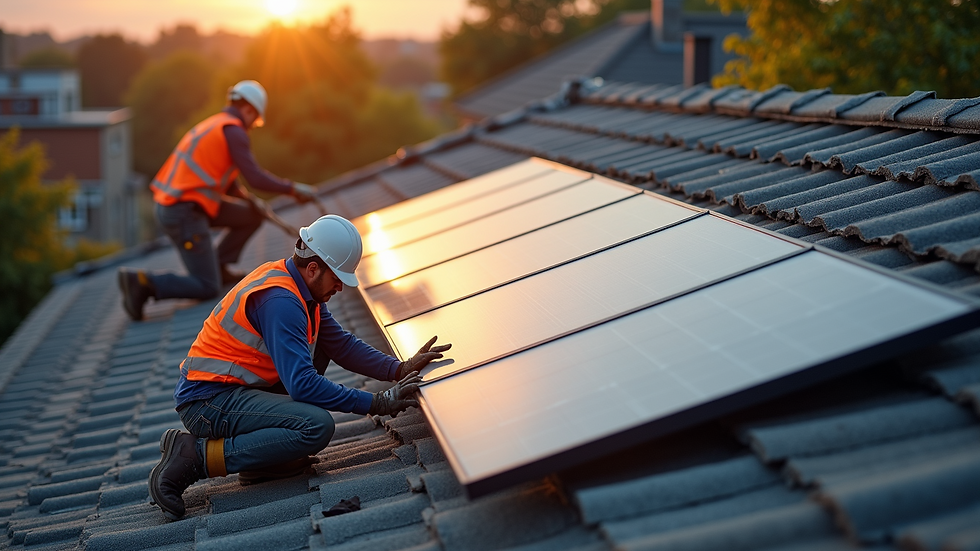Maximizing Solar Energy for Your Home
- Neil Bowater

- Sep 24, 2025
- 4 min read
Harnessing the power of the sun is no longer a futuristic dream. Today, home solar energy systems offer a practical, efficient, and increasingly affordable way to reduce energy bills and shrink your carbon footprint. I’ve explored the ins and outs of solar technology, and I’m excited to share how you can maximize solar energy for your home. Whether you’re new to solar or looking to optimize an existing setup, this guide will walk you through essential strategies and insights.
Understanding Home Solar Energy Systems: The Basics and Beyond
Home solar energy systems convert sunlight into electricity using photovoltaic (PV) panels installed on rooftops or nearby land. These panels capture solar rays and transform them into usable power for your household. But it’s not just about slapping panels on your roof. To truly maximize efficiency, you need to consider several factors:
Panel placement and orientation: South-facing roofs typically receive the most sunlight in the UK, but east or west-facing roofs can also work with some adjustments.
Shading: Trees, chimneys, or nearby buildings can cast shadows that reduce panel output. Regularly check and trim any obstructions.
Panel type and quality: Monocrystalline panels tend to be more efficient but costlier, while polycrystalline panels offer a budget-friendly alternative.
Inverter efficiency: The inverter converts DC electricity from panels into AC electricity for your home. A high-quality inverter ensures minimal energy loss.
By optimizing these elements, you can significantly boost your system’s performance. Plus, integrating battery storage allows you to save excess energy for nighttime use or cloudy days, increasing your energy independence.

Choosing the Right Home Solar Energy Systems for Your Property
Selecting the right system depends on your energy needs, budget, and property characteristics. Here’s how I approach it:
Assess your energy consumption: Review your electricity bills to understand your average daily usage in kilowatt-hours (kWh). This helps determine the size of the system you need.
Evaluate your roof space and condition: Ensure your roof can support solar panels structurally and has enough space for the number of panels required.
Consider future energy needs: If you plan to add an electric vehicle (EV) charger or expand your household, factor in the additional power demand.
Explore incentives and financing: Government schemes, grants, or low-interest loans can make solar installation more affordable.
For those interested in solar energy for homes, professional consultation is invaluable. Experts can provide tailored solutions that align with your goals and property specifics.

How Much Solar Power Is Needed to Power a House?
Determining the right amount of solar power for your home is crucial. It depends on several variables:
Daily energy consumption: The average UK household uses about 10 kWh per day, but this varies widely.
Sunlight availability: The UK’s climate means solar panels produce less energy in winter months.
System efficiency: Panel quality, inverter efficiency, and shading impact output.
To calculate, divide your daily energy use by the average daily peak sunlight hours (usually around 3-4 hours in the UK). For example, if you use 10 kWh daily and get 4 peak sunlight hours, you’d need a 2.5 kW system (10 kWh ÷ 4 hours = 2.5 kW).
Keep in mind, oversizing your system slightly can cover cloudy days and future energy needs. Pairing your system with a battery storage solution ensures you have power when the sun isn’t shining.

Practical Tips to Maximize Solar Energy Output
Maximizing your solar system’s output isn’t just about installation. Here are actionable tips I’ve found effective:
Regular maintenance: Clean panels periodically to remove dust, leaves, or bird droppings that block sunlight.
Monitor system performance: Use apps or monitoring tools to track energy production and spot issues early.
Time your energy use: Run high-energy appliances like washing machines or EV chargers during peak sunlight hours to use solar power directly.
Upgrade to smart home technology: Smart thermostats and energy management systems can optimize consumption based on solar availability.
Consider solar battery storage: Store excess energy generated during the day for use at night or during outages.
These steps help you get the most from your investment and reduce reliance on the grid.
Integrating Solar Energy with EV Charging Solutions
As electric vehicles become more common, pairing solar energy with EV charging is a game-changer. Charging your EV with solar power reduces emissions and cuts costs. Here’s how to make it work:
Install a dedicated solar-powered EV charger: These chargers connect directly to your solar system, prioritizing solar energy use.
Use smart charging schedules: Charge your EV during peak solar production to maximize clean energy use.
Consider battery storage: Store solar energy to charge your EV overnight without drawing from the grid.
Work with providers specializing in EV and solar integration: Companies like EV Smart offer innovative solutions tailored to this need.
This synergy supports sustainable transportation and energy independence, aligning perfectly with the UK’s green energy goals.
Taking the Next Step Toward Solar Empowerment
Switching to solar energy is a powerful step toward sustainability and cost savings. By understanding your home’s energy needs, choosing the right system, and optimizing usage, you can maximize the benefits of solar power. Remember, professional advice and quality installation are key to long-term success.
If you’re ready to explore options, consider consulting experts who specialise in solar energy for homes. They can guide you through the process, from initial assessment to installation and beyond.
Solar energy is not just an investment in your home; it’s an investment in a cleaner, smarter future. Let’s harness the sun’s power and drive the change toward sustainable living.









Comments